Special Report
15 Most Stressed Out Cities

Published:
Last Updated:

Financial insecurity, health problems, strenuous work hours, and long commute times can all contribute to stress. In the United States, none of these stressors are especially rare. And while some level of stress can act as a motivator and have a positive impact, beyond that stress has mostly negative consequences.
The already relatively high stress levels in the United States are even worse in some cities. To highlight how stress levels can vary geographically, 24/7 Wall St. reviewed the percentage of adults in U.S. metro areas reporting daily stress from research partnership Gallup-Healthways Well-Being Index.
[in-text-ad]
Chico, California leads the nation with over 50% of adults reporting daily stress. Salt Lake City, Utah rounds out our list of 15 cities with 45% of adults experiencing stress for a large part of every day. For reference, 40% of adults nationwide report regular stress.
Click here to see America’s 15 most stressed out cities.
A recent American Psychological Association survey found lower-income households are significantly more likely to experience stress than other households overall. During the recession and even after the recovery, money and finances remained a top source of stress across the country. According to the APA research, 72% of Americans feel stressed about money on a monthly basis.
The poverty rate in seven of the 15 most stressed-out cities is higher than the national rate of 14.7%.
Financial concerns lead many adults to put off health care, increasing the severity and cost of medical issues down the road. Stress is a compounding factor, as chronically stressed individuals are at a significantly greater risk of cardiovascular disease and other maladies. Either by increasing the risk of cardiovascular disease, triggering a heart attack, or as a result of coping strategies such as overeating or smoking, regular stress can lead directly to serious health problems. These issues in turn can become stressful hindrances to daily activity.
In nine of the 15 most stressed-out cities, adults are more likely than adults nationwide to report sub-optimal levels of health.
A recent National College Health Assessment study found approximately half of U.S. college students struggled with overwhelming anxiety over the past year. The findings can help explain the prevalence of college towns on this list.
Just over 7% of people nationwide are currently enrolled in college or graduate school. In nine of the 15 most stressed cities, the percentage of residents enrolled in postsecondary institutions is greater than the national share.
Click here to read our methodology.
These are the 15 most stressed out cities.

15. Salt Lake City, UT
> Pct. with stress: 45.1%
> Pct. of adults in fair/poor health: 12.7%
> Poverty rate: 10.2%
> Avg. weekly hours worked: 36.1
Some 45.1% of adults in Salt Lake City report feeling stress for much of the day, a larger share than in the vast majority of U.S. metro areas. In the United States, stress is frequently job-related, and people in Salt Lake City tend to work long hours. The average private sector employee works 36.1 hours a week, longer than in all but eight other metro areas reviewed.
Chronic stress can lead to a number of medical conditions, including high cholesterol, high blood pressure, and diabetes. Yet, the incidences of these conditions among adults in Salt Lake City are well below the comparable national rates.
[in-text-ad]

14. Lafayette, LA
> Pct. with stress: 45.1%
> Pct. of adults in fair/poor health: 19.1%
> Poverty rate: 19.0%
> Avg. weekly hours worked: 36.5
Money and finances are among the most common causes of stress in the United States, and in Lafayette, a large share of residents face serious financial hardship. Some 19.0% of all metro area residents are in poverty compared to 14.7% of Americans. Work is another major source of stress, and private sector workers in the Lafayette area work longer hours than most Americans. The average employee in the Lafayette metro, including those working part time, works 36.5 hours a week, more than in all but five other metro areas.
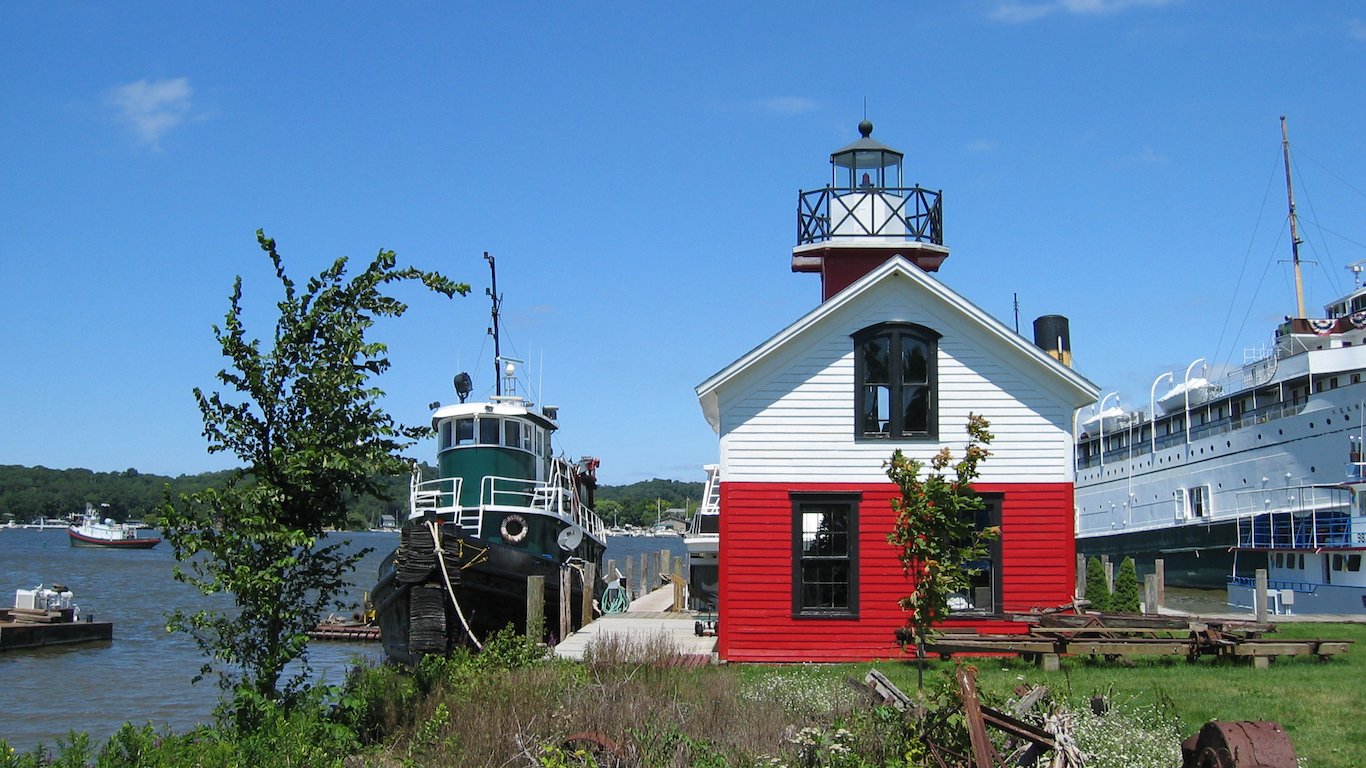
13. Kalamazoo-Portage, MI
> Pct. with stress: 45.1%
> Pct. of adults in fair/poor health: 16.3%
> Poverty rate: 16.0%
> Avg. weekly hours worked: 33.4
Young people, especially college students, face pressures that can increase the likelihood of chronic stress. In Kalamazoo-Portage, where more than 45% of adults report feeling stress, university students comprise a relatively large share of the population. Home to Western Michigan University, more than one in 10 metro area residents are enrolled in a post-secondary institution, a larger share than in the vast majority of U.S. metro areas.
Safety concerns among area resident may have also contributed to stress levels in the Kalamazoo metro area. The metro area’s violent crime rate of 471 incidents per 100,000 people is well above the national rate of 373 per 100,000 people.

12. Medford, OR
> Pct. with stress: 45.1%
> Pct. of adults in fair/poor health: 16.3%
> Poverty rate: 20.3%
> Avg. weekly hours worked: 33.5
Some 45.1% of Medford, Oregon residents report living with daily stress compared to 40.0% of Americans. Money is likely a main source of stress in the area as more than 20% of area residents are in poverty, one of the highest rates of metro areas reviewed.
Stress increases the risk of certain physical and mental conditions. In Medford, high levels of stress may contribute to the prevalence of high blood pressure and depression, for example. Across the metro area, 32.1% of adults have had high blood pressure in their lifetime, and 23.5% have dealt with depression, higher than the corresponding 28.9% and 17.8% national shares.
[in-text-ad-2]
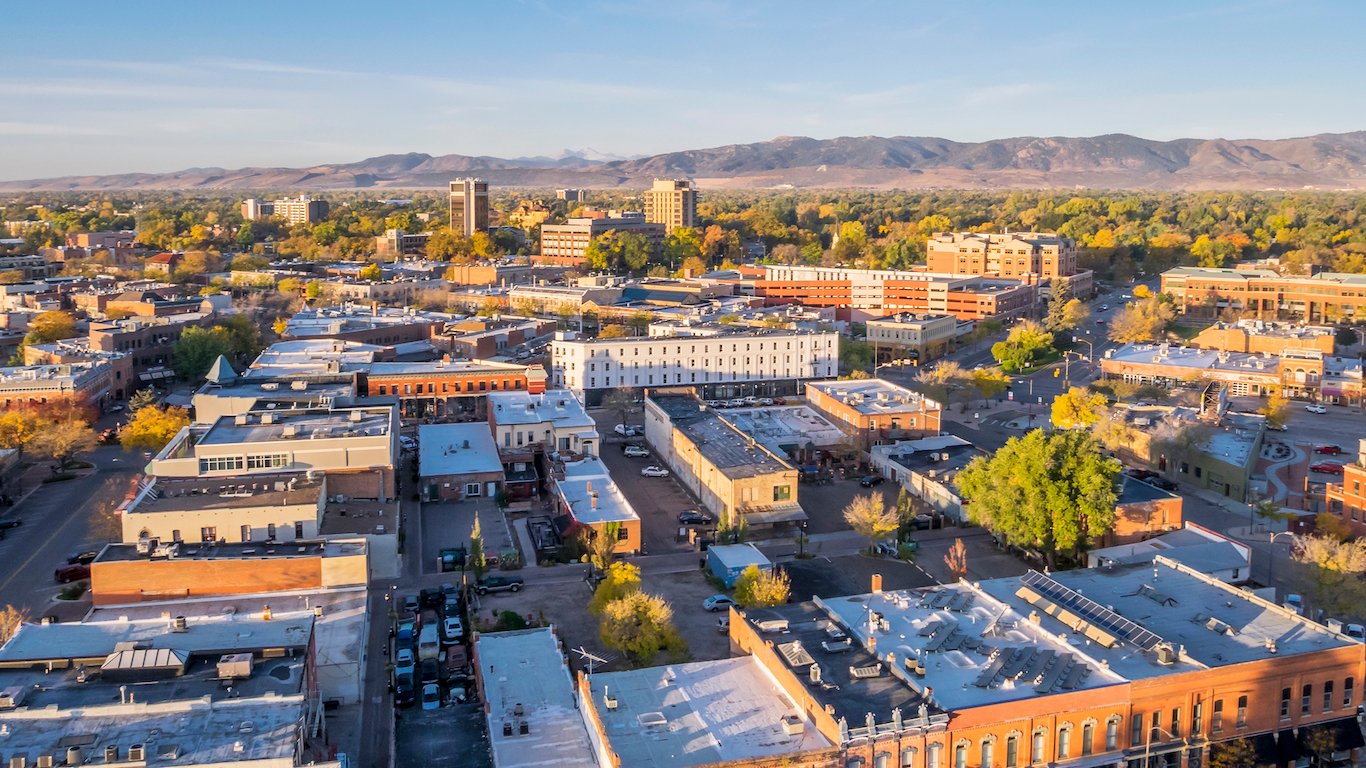
11. Fort Collins, CO
> Pct. with stress: 45.3%
> Pct. of adults in fair/poor health: 10.0%
> Poverty rate: 12.7%
> Avg. weekly hours worked: 33.5
Due largely to the presence of Colorado State University, about 12.3% of Fort Collins metro area residents are college or graduate students, considerably more than the 7.0% national share. Because university students frequently experience higher levels of stress than others the metro area’s large student population may partially explain the prevalence of stress in the area.
While young people and college students are often more likely to experience stress, they are less likely to report the health complications associated with long-term stress. In Fort Collins, high blood pressure and high cholesterol are less common than across the United States as a whole.
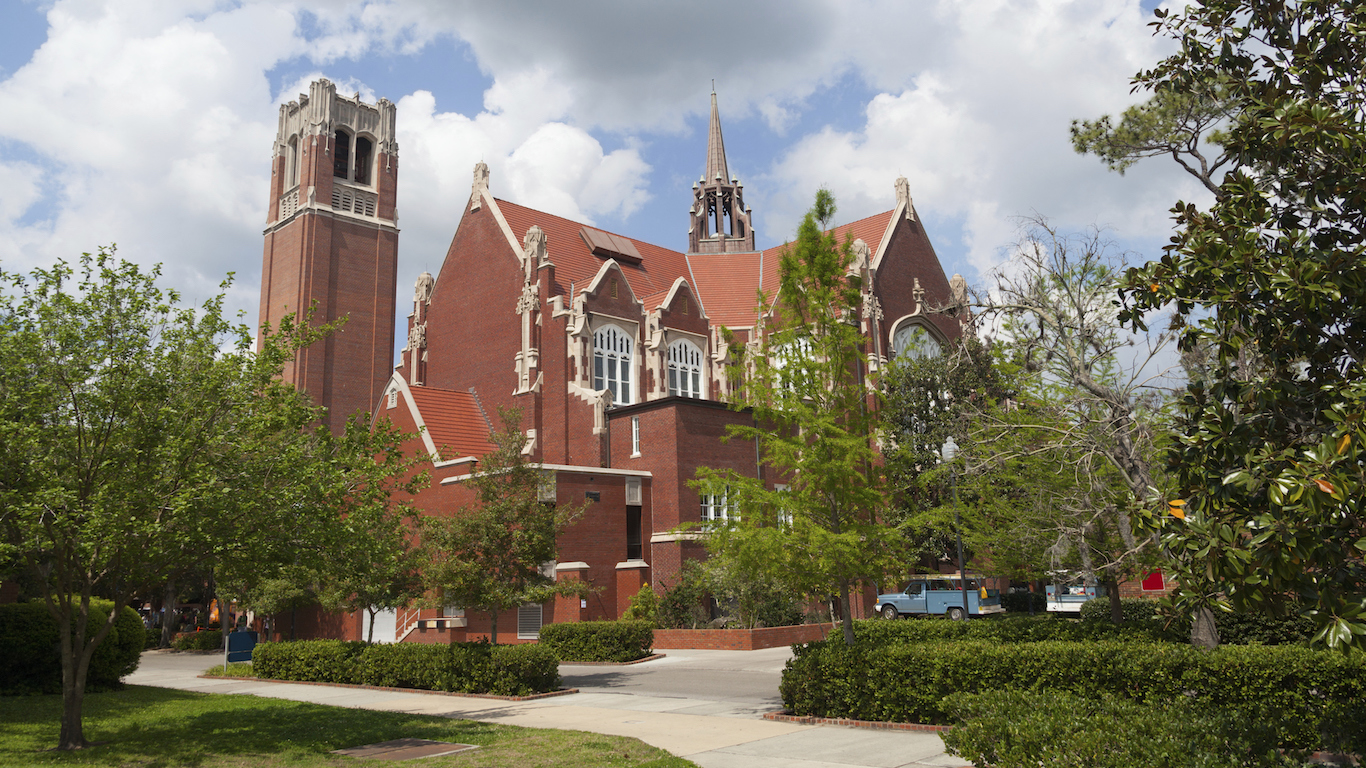
10. Gainesville, FL
> Pct. with stress: 45.4%
> Pct. of adults in fair/poor health: 15.9%
> Poverty rate: 21.9%
> Avg. weekly hours worked: 32.6
A recent National College Health Assessment study found approximately half of U.S. college students struggled with overwhelming anxiety in the last year. Another study found that close to a third of university students have considered attempting suicide at some point in their lives. These findings could help explain the prevalence of college towns on this list.
The Gainesville, Florida metro area, home to the University of Florida, Santa Fe College, and numerous other institutions, is a notable example. Nearly 20% of residents are enrolled in college or graduate school, the highest percentage of all metro areas considered.
[in-text-ad]
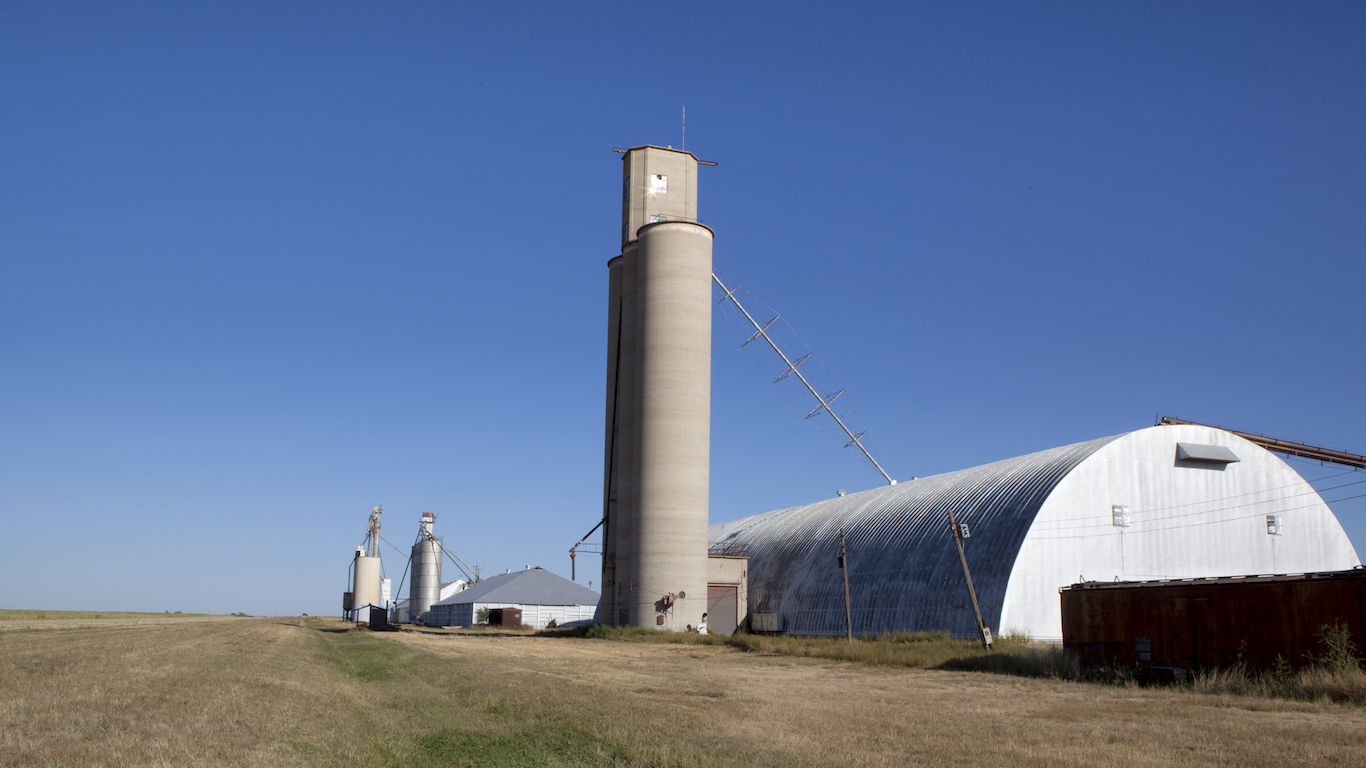
9. Lubbock, TX
> Pct. with stress: 45.7%
> Pct. of adults in fair/poor health: 20.4%
> Poverty rate: 20.7%
> Avg. weekly hours worked: 34.1
Money is one of the biggest stressors for most Americans, and in the Lubbock metro area, many are struggling financially. More than one in every five metro area residents live in poverty, the 10th largest share of the 189 metro areas reviewed. In addition to higher stress, financial concerns can lead adults to put off needed medical treatment, which can contribute to more severe health problems down the road. Stress itself leads to worse health. Like a number of other stressed cities, a relatively high share of Lubbock adults, 20.4%, report sub-optimal health.
College and graduate students are also at elevated risk of frequent stress, and an outsized share of Lubbock residents are enrolled in post secondary school. Home to Texas Tech University and its 36,551 students, 13.4% of the metro area population is in college or graduate school.
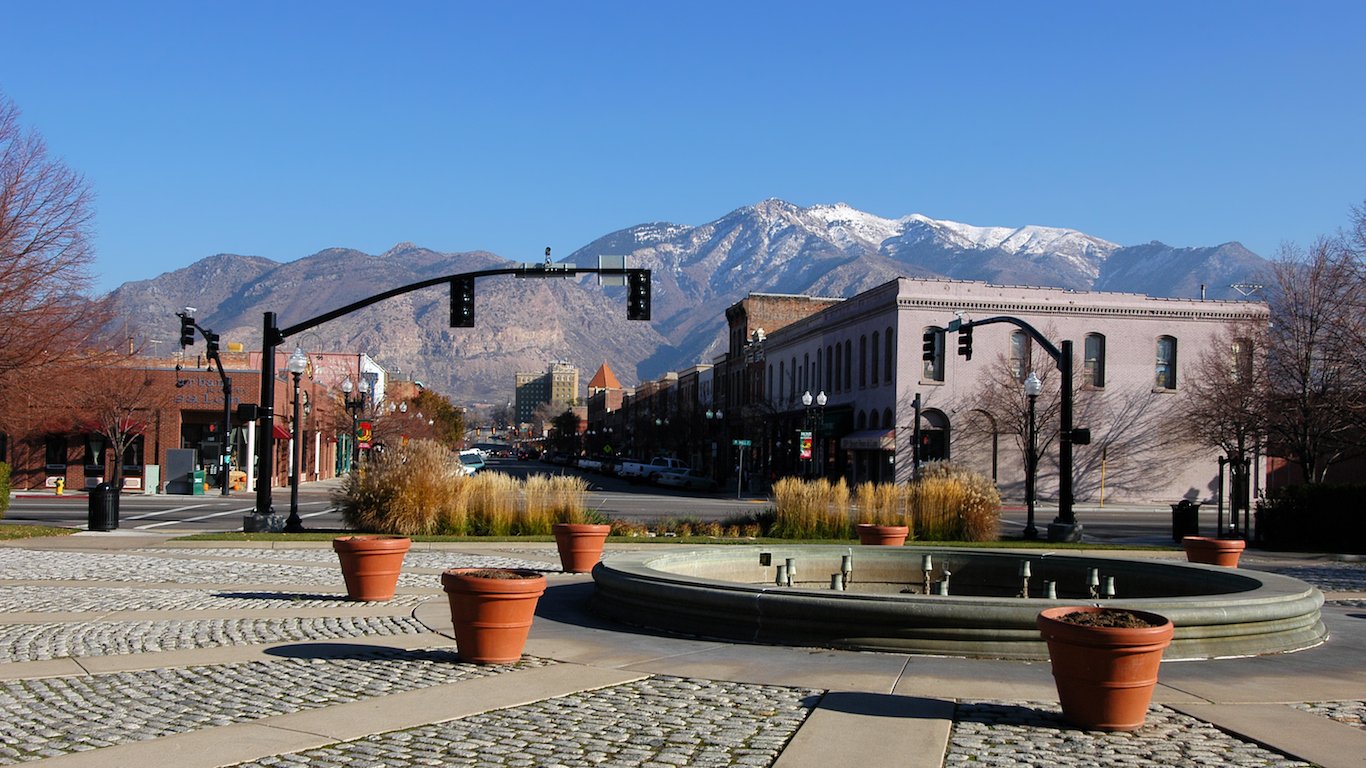
8. Ogden-Clearfield, UT
> Pct. with stress: 45.7%
> Pct. of adults in fair/poor health: 11.9%
> Poverty rate: 8.8%
> Avg. weekly hours worked: 34.2
Well-known stress-related conditions are not nearly as prevalent in Ogden-Clearfield as might be expected in one of the nation’s most stressed out cities. Looking at self-reported health and financial security metrics, for example, metro area residents are considerably better off than most Americans. A relatively long average workweek, which at over 34 hours is one of the longer workweeks, could partially explain the high stress level in the metro area.

7. Vallejo-Fairfield, CA
> Pct. with stress: 46.0%
> Pct. of adults in fair/poor health: 15.5%
> Poverty rate: 12.1%
> Avg. weekly hours worked: 32.5
For many Americans, money and budgeting is the root cause of stress. In the Vallejo-Fairfield metro area, the median household income of $67,443 a year is nearly $11,700 higher than the median income nationwide. However, the area’s high cost of housing may obscure the financial challenges many residents face. Experts have long recommended that people should not spend more than 30% of their income on housing. Yet half of all renters in the Vallejo-Fairfield metro area spend at least 35% of their income on housing, compared to only 41.4% of renters nationwide.
[in-text-ad-2]

6. Daphne-Fairhope-Foley, AL
> Pct. with stress: 46.0%
> Pct. of adults in fair/poor health: 16.4%
> Poverty rate: 12.8%
> Avg. weekly hours worked: 33.2
Divorce is often a stressful ordeal. According to Gallup-Healthways, daily reported stress is less common among married Americans than non-married individuals, and jumps significantly among Americans who have been separated. Divorce is relatively common in the Daphne-Fairhope-Foley metro area. Some 12.7% of area men and 15.9% of women are divorced, each among the larger shares of any U.S. metro area and well above the 9.7% and 12.3% national shares.
At the same time, despite the relatively high 46.0% share of area adults who report significant stress, Daphne residents are less likely to suffer from depression.
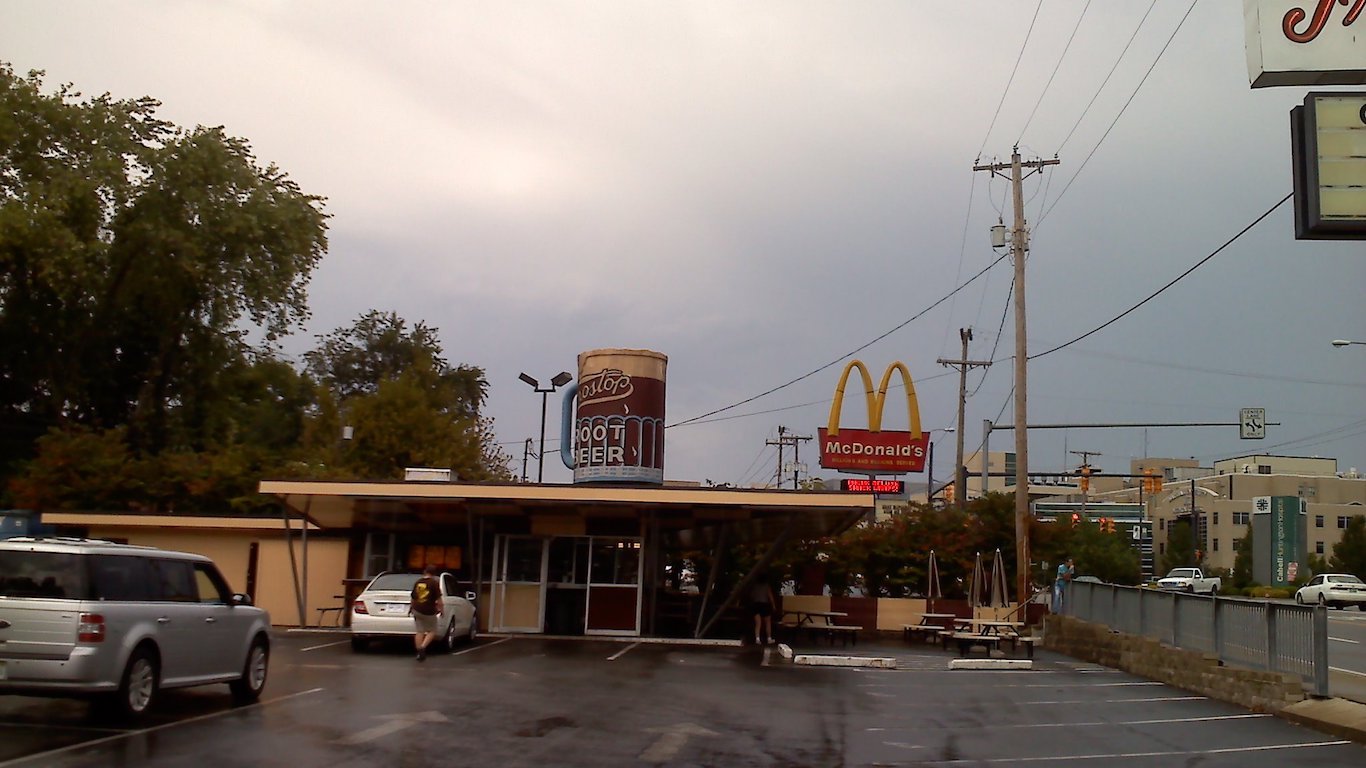
5. Huntington-Ashland, WV-KY-OH
> Pct. with stress: 48.2%
> Pct. of adults in fair/poor health: 20.8%
> Poverty rate: 20.1%
> Avg. weekly hours worked: 33.7
Regular stress can lead to serious health problems, which in turn can hinder daily activity, further adding to stress. In Huntington-Ashland, 20.8% of adults report fair or poor health, well above the 15.0% of adults nationwide who report such sub-optimal levels of health. Nearly 40% of residents report high blood pressure, and nearly 30% report having experienced depression — the third highest and highest such rates of all metro areas reviewed. These two conditions are commonly tied to stress.
[in-text-ad]
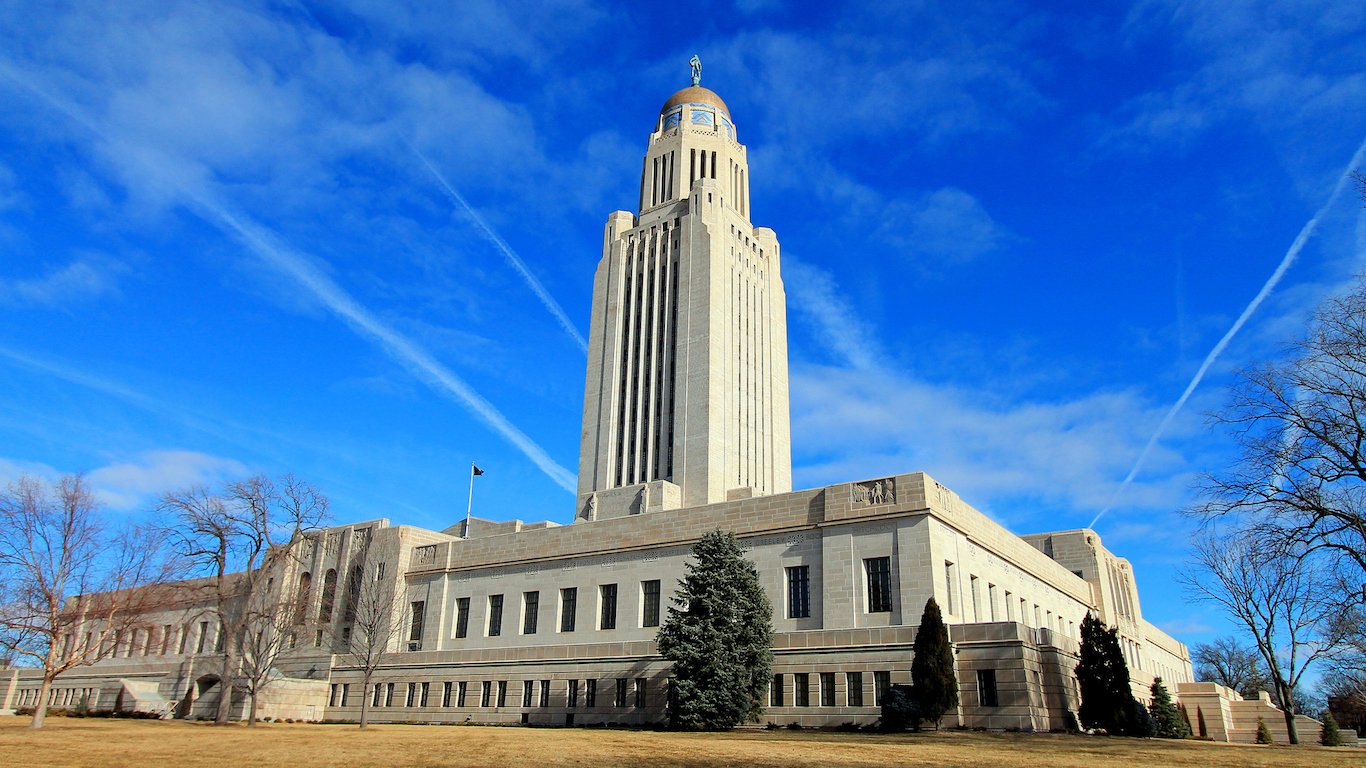
4. Lincoln, NE
> Pct. with stress: 48.8%
> Pct. of adults in fair/poor health: 9.8%
> Poverty rate: 13.7%
> Avg. weekly hours worked: 33.9
Several stress-related conditions are not nearly as prevalent in Lincoln as might be expected in one of the nation’s most stressed out cities. The percentage of adults reporting fair or poor health, for example, is less than 10%, one of the lowest such shares nationwide. Similarly, while a long commute time is frequently a major factor in high daily stress levels, the average Lincoln commuter travels 18.5 minutes a day, well below the national average of 26.4 minutes.
Like a number of other high stress cities, Lincoln is home to a major university, the University of Nebraska-Lincoln, and 12.9% of residents are enrolled in postsecondary institutions. Nationwide, just over 7% of people are university students. Because stress is relatively common among college students, the large student population could help explain stress levels in the city.
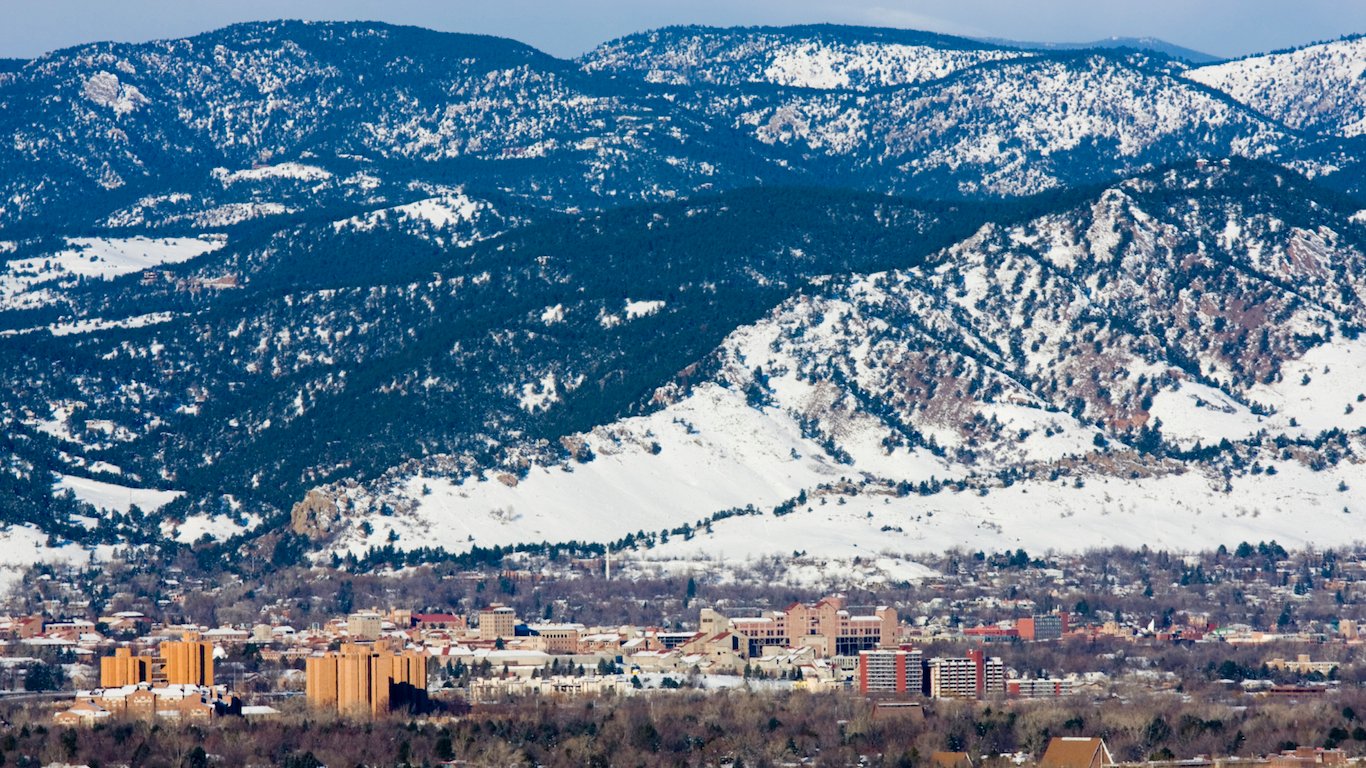
3. Boulder, CO
> Pct. with stress: 48.8%
> Pct. of adults in fair/poor health: 10.8%
> Poverty rate: 12.9%
> Avg. weekly hours worked: 33.8
College students can face a myriad of stressors as they balance course work, part time jobs, and uncertainty about their future. Boulder is one of the biggest college towns in America, with 13.8% of metro area residents enrolled in college or graduate school, close to double the national average share. Many of those students are likely among the 48.8% of Boulder residents who report feeling regularly stressed.
Money is another major source of stress in the United States. While the annual median income in Boulder is $16,000 higher than it is nationwide, the area’s cost of living can make budgeting difficult. Nearly 50% of renters in the area spend a larger than recommended percentage of income on housing, compared to only 41.4% of renters nationwide.

2. Provo-Orem, UT
> Pct. with stress: 50.1%
> Pct. of adults in fair/poor health: 11.3%
> Poverty rate: 12.6%
> Avg. weekly hours worked: 33.9
The Provo-Orem metro area is one of only two U.S. cities where just over half of all adults report regular stress. It is also one of three Utah metro areas to rank among the most stressed in the country.
Like the majority of metro areas with large shares of residents reporting stress, Provo-Orem is home to a large share of college and graduate students, who often report higher levels of stress than other Americans. Of metro area residents, 11.8% are enrolled in postsecondary school, well above the 7.0% national share. Provo is home to Brigham Young University, one of the largest private institutions in the country.
[in-text-ad-2]
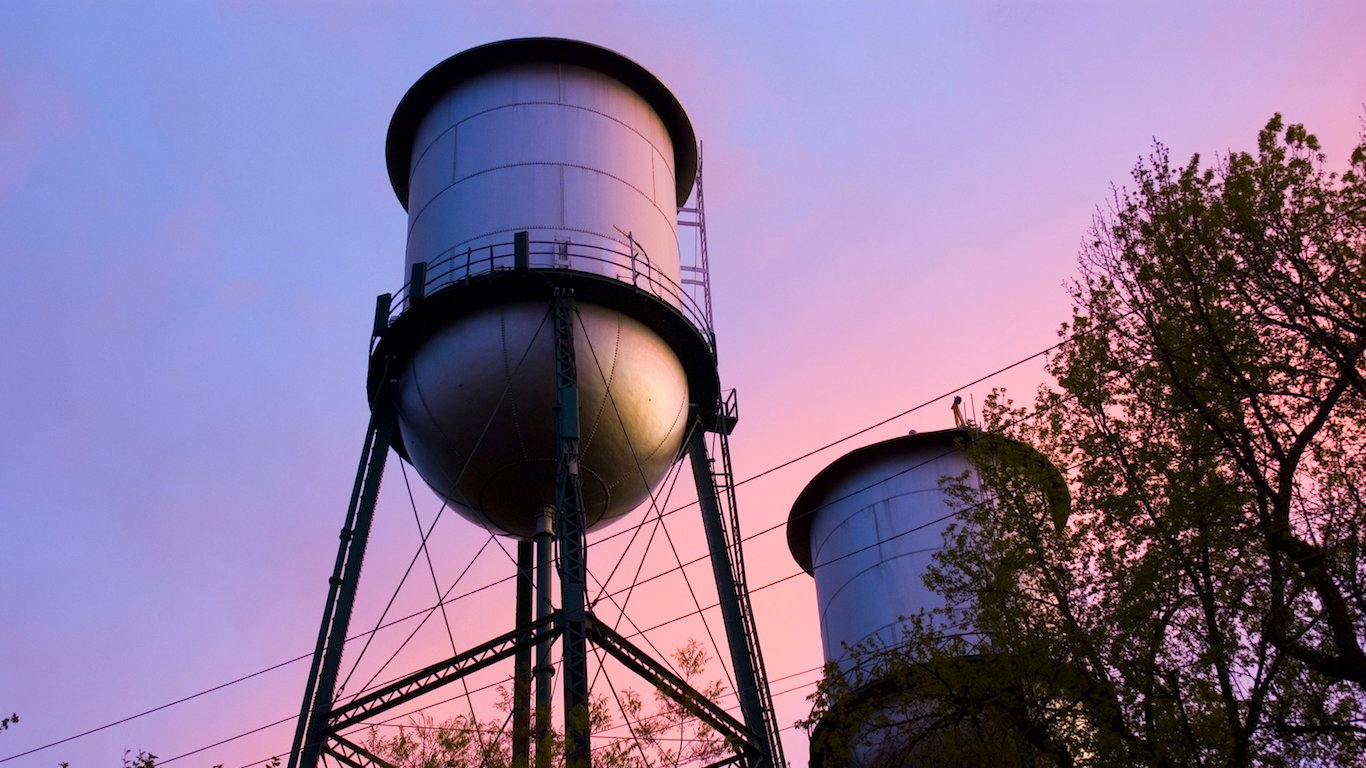
1. Chico, CA
> Pct. with stress: 50.7%
> Pct. of adults in fair/poor health: 16.4%
> Poverty rate: 21.8%
> Avg. weekly hours worked: 32.5
Divorce is often a stressful ordeal. According to Gallup-Healthways, daily reported stress is less common among married Americans than non-married individuals, and jumps significantly among Americans who have been separated. A relatively large share of adults in Chico have been through a divorce. Of metro area men 15 and older, 11.0% are divorced. The rate is an even higher for women at 15.0%. Nationwide, 9.7% of men and 12.3% of women are divorced.
Money is also a major source of stress across the nation, and many in Chico face serious financial hardship. Nearly 22% of the population lives in poverty, one of the largest such shares in the country and well above the 14.7% national poverty rate.
Methodology
To identify the most stressed cities, 24/7 Wall St. reviewed the percentage of adults reporting daily stress from the research partnership between polling and health advocacy group Gallup-Healthways Well-Being Index. Gallup’s results are based on roughly 354,500 telephone interviews conducted nationwide between January 2015 and December 2016. Gallup only reported the results for the 189 metropolitan areas in which at least 300 interviews were completed.
We also considered metrics related to common sources of stress — money and work — in U.S. metropolitan areas. For possible money-related stressors, we reviewed poverty rates and housing affordability from the U.S. Census Bureau’s 2015 American Community Survey. For possible work-related stressors, we reviewed average weekly work hours from the Bureau of Labor Statistics, as well as average daily commute times in minutes from the ACS.
The number of violent crimes reported for every 100,000 metro area residents came from the Federal Bureau of Investigation’s 2015 Uniform Crime Report.
Finding a qualified financial advisor doesn’t have to be hard. SmartAsset’s free tool matches you with up to 3 fiduciary financial advisors in your area in 5 minutes. Each advisor has been vetted by SmartAsset and is held to a fiduciary standard to act in your best interests. If you’re ready to be matched with local advisors that can help you achieve your financial goals, get started now.
Thank you for reading! Have some feedback for us?
Contact the 24/7 Wall St. editorial team.